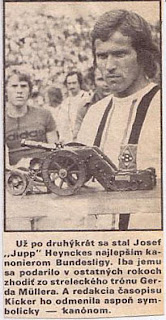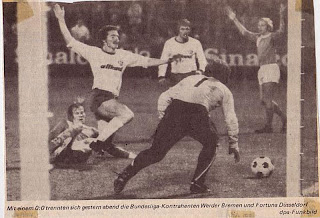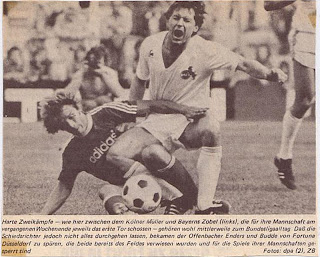With Bayern so weak, the German championship was open for grabs? Not so. It was predictable champion: Borussia Moenchengladbach won their third Bundesliga title. Looked natural. It also looked like that Borussia were progressing constantly: by 1975 their coach Hennes Weissweiler was no longer a guy with difficult to pronounce name, but one of the top world coaches, known to all and sundry. Winning was the name of his game.

After the match with Eintracht Braunscweig and Jensen scoring, Berti Fogts shows to the public the German champion shield.

Jupp Heynckes got the gun as the top goalscorer of the championship.


Top, left to right: Hennes Weissweiler –coach, Henning Jensen, Hans Posner, Gunter Kostner, Hans-Jurgen Wittkamp, Josef Heynckes, Christian Kulik, Dietmar Danner, Hans Klinkhammer, Frank Schafer, Horst Koppel, Stock – masseur.
Sitting: Ulrich Surau, Allan Simonsen, Karl del’Haye, Bertie Fogts, Wolfgang Kleff, Hans Quasten, Ulrich Stielike, Rainer Bonhof, Herbert Wimmer, Roger Roebben.
By now, Borussia were firmly established as the second best German club, the constant rivals of Bayern. They were also considered the alternative of Bayern – a maverick team, devoted to free, almost wild, attacking football, unlike to measured, disciplined, and stiff brand of the Bavarians. Borussia were thought to be the team scoring madly, a main part of the legend about them. They scored plenty, but… usually Bayern scored more goals. So far, 1974-75 was the highest scoring season for Borussia - 86 goals! Alas, even now they were not the bst scorers – third placed Eintracht Frankfurt bested them with 89. So much for the legend, but Borussia were really dedicated to endless attack – unlike Bayern’s, their defense was the weakest line and allowed considerable goals against Borussia. 40 in the winning season – more or less, Borussia depended on outscoring the opposition: about 2 goals for 1 received. The mavericks were not really mavericks, but one thing they did much better than Bayern: they replaced players better, and with the years the squad as getting increasingly stronger.
If Bayern became a superclub, Borussia were relatively small one and this difference shaped club policies in favour of Borussia. Bayern was buying high profile players, but never as big as their secret superstars. Borussia had to sell and buy cheap replacements. To sell Beckenbauer or Muller was almost unthinkable in Munich. In Moenchengladbach there was no such stigma – cash was needed, so Netzer was sold without fuss – his absence opened room for younger unknowns. One result was the performance of imported players: when Torstensson and Andersson came to Bayern with considerable fame, but played erratically and somewhat not up to expectations, Borussia acquired 2 young unknown Danes – Simonsen and Jensen. Both not only established themselves as starters, but constantly improved their game. By 1978 people hardly remembered Bayern’s Swedes whether Borussia’s Danes were world famous strikers, eventually ending in Barcelona and Real Madrid. And they were not alone.
Like Bayern, Borussia depended on cluster of big stars – Fogts, Heynckes, Wimmer, Kleff. There were players close to the European and World champions and often included in the national team – Koppel and Danner. There were supportive workaholics like Wittkamp, Kulik, and Surau. But there was a lot of young talent, aiming on stardom: Bonhof already established himself in the national team and certainly was a star, but others were pushing too – apart from the two Danes, there was Stielike. There was Del’Haye. May be Klinkhammer. In a way, the departure of Netzer provided opening for a very fruitful policy: nobody was untouchable and, therefore, youngsters had very good chance for a starting place. Rummenige had to wait until Muller decided to leave Bayern – Simonsen did not have to wait for anybody. If anything, Simonsen had to watch his back for equally young Del’Haye… which motivated the Dane to get increasingly better.
Policy apart, Borussia appeared better balanced team than Bayern – goalkeeping and defense were bellow Bayern’s standards, yet, good enough. Midfield hardly suffered from the absense of Netzer – there were Wimmer, Bonhof, and – increasingly stronger Stielike. In contrast, Bayern really had only Hoenes and may be Kapellmann. In attack – Bayern depended on Muller. Borussia had Simonsen on the right wing; Jensen as a centre-forward; and Heynckes on the left wing. If anybody was coming close to Gerd Muller at the time, he was Heynckes, consistently scoring about 30 goals a season. Younger, eagerer, freer Borussia seemed to be the better present – and future – of West German football. They were still to win titles – coached by Udo Lattek, who replaced Weissweiler after the end of the season. Weissweiler went to Barcelona and Lattek had a good laugh at Bayern’s expense, but it was a bit later. For now – Borussia collected third title and was getting ready for more.






























 And the German football was to place to be as well – the thrill was huge: from legendary players like Karl – Heinz Schnellinger relegated to Borussia Moenchengladbach champions again. Snow, slush, great grass, penalties, heavy tackles, superstars arguing with referees… the present was German and the future – without a doubt German too.
And the German football was to place to be as well – the thrill was huge: from legendary players like Karl – Heinz Schnellinger relegated to Borussia Moenchengladbach champions again. Snow, slush, great grass, penalties, heavy tackles, superstars arguing with referees… the present was German and the future – without a doubt German too.



















 Unlike the other two losers, Stuttgart were old timers: one of the original members of the Bundesliga. Perhaps nobody expected the home town of BMW to be a weakling in football, but VfB were mediocre mid-table club so far – their best place was 5th. This season they ended in the relegation zone and moved down to sample the new Second Bundesliga. Hard to believe today.
Unlike the other two losers, Stuttgart were old timers: one of the original members of the Bundesliga. Perhaps nobody expected the home town of BMW to be a weakling in football, but VfB were mediocre mid-table club so far – their best place was 5th. This season they ended in the relegation zone and moved down to sample the new Second Bundesliga. Hard to believe today. 

